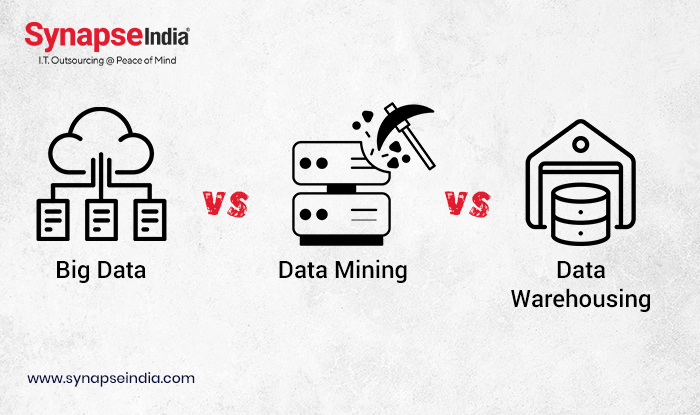 27 Jan 2024
27 Jan 2024
Big Data refers to the vast and complex sets of data that are too large and diverse to be effectively managed, processed and analyzed using traditional data processing tools. It encompasses structured and unstructured data, streaming data, and data from various sources, presenting unique challenges and opportunities for organizations. This data is characterized by its vastness, complexity, and the need for advanced technologies to process and derive meaningful insights from it. Unlike traditional data processing methods, Big Data encompasses datasets too large and dynamic to be effectively managed and analyzed by conventional databases.

Big Data involves massive volumes of data that exceed the capacity of traditional database systems. This includes large datasets generated from diverse sources such as social media, sensors, and business transactions.
The speed at which data is generated, processed, and analyzed in real-time. Streaming data, social media updates, and sensor data contribute to the high velocity of Big Data.
Big Data comes in various formats, including structured (traditional databases), semi-structured (XML, JSON), and unstructured (text, images, videos). Dealing with this variety requires flexible data processing techniques.
The quality and reliability of the data can vary significantly. Big Data systems need to handle uncertainties, inaccuracies, and inconsistencies in the data.
Big Data has become a cornerstone of modern business intelligence, offering unprecedented opportunities for organizations willing to harness the potential hidden within their data.

Data Mining is the process of discovering patterns, correlations, and insights from large datasets. It involves extracting valuable information and knowledge from raw data, helping businesses make informed decisions and predictions. Data Mining techniques include clustering, classification, regression, and association rule mining. It is widely used in various industries such as finance, marketing, healthcare, and telecommunications to uncover hidden patterns and trends.
Data Warehousing involves the collection, storage, and management of large volumes of structured data from various sources to support business intelligence and reporting. It provides a centralized repository for historical and current data, facilitating efficient analysis and reporting. Data Warehouses often integrate data from disparate sources to provide a comprehensive view for decision-makers.
Above we have read all the features of Big Data. Here let’s explore a detailed comparison of Big Data vs Data Mining vs Data Warehousing.
| Feature | Big Data | Data Mining | Data Warehousing |
|---|---|---|---|
| Data Scale | Handles massive volumes of data | Analyzes patterns in datasets | Stores and manages structured data |
| Purpose | Process and analyze large-scale, diverse data sets | Discover patterns, trends, and insights | Centralized storage for structured data |
| Data Sources | A variety of structured and unstructured sources | Existing datasets and databases | Aggregated data from various sources |
| Processing Speed | Emphasizes speed and real-time processing | Focuses on extracting patterns efficiently | Supports fast querying and reporting |
| Techniques | Machine learning, predictive analytics | Pattern recognition, clustering | Query and reporting tools, ETL processes |
| Use Cases | Predictive analytics, machine learning, real-time processing | Market basket analysis, anomaly detection | Business intelligence, reporting, analytics |
| Challenges | Scalability, complexity, data governance | Data quality, scalability, interpretation | Data integration, consistency, performance |
| Tools/Frameworks | Hadoop, Spark, Flink, Kafka | RapidMiner, Weka, KNIME | Amazon Redshift, Snowflake, Teradata |
Big Data is considered superior to other similar technologies due to several key advantages that set it apart in terms of processing, managing, and deriving insights from massive datasets. Here are some benefits why Big Data is often considered the best:
Big Data analytics provides deep insights into large and complex datasets, uncovering patterns, trends, and correlations that may go unnoticed with traditional analytics.
Big Data technologies enable real-time data processing, allowing organizations to analyze and act on data as it is generated, facilitating quick decision-making.
Big Data solutions offer cost-effective storage options, especially with distributed file systems, making it feasible for organizations to store and manage large volumes of data.
Leveraging Big Data effectively provides a competitive advantage by enabling organizations to make data-driven decisions, optimize operations, and gain insights into customer behaviors.
Big Data platforms often integrate with machine learning algorithms, enhancing the ability to analyze data, make predictions, and automate decision-making processes.
Big Data, Data Mining, and Data Warehousing are integral components of the modern data landscape, each contributing unique capabilities to support informed decision-making and business intelligence. These technologies empower businesses to harness the potential of their data, uncover valuable insights, and make informed decisions. Whether it's the real-time processing capabilities of Big Data, the pattern recognition of Data Mining, or the structured storage of Data Warehousing, each plays a crucial role in optimizing business operations and facilitating growth. These technologies can provide a comprehensive and future-ready solution for businesses seeking to thrive in the data-driven landscape.
.png)
 12 Feb 2025
12 Feb 2025
